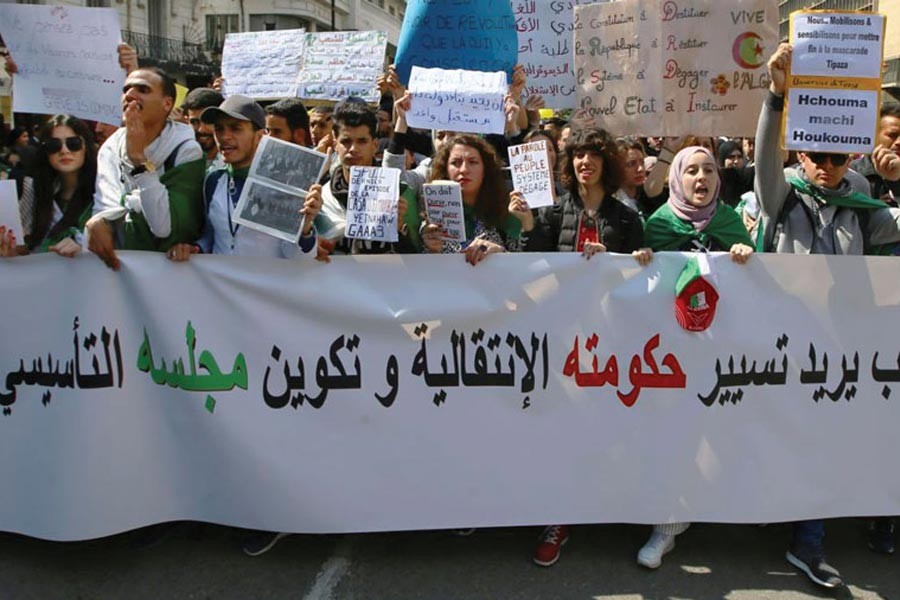Mass protests in Algeria and Sudan have recently removed two aging autocrats, ending 20 and 30 years, respectively, of absolutist rule. In both countries, the insurgents are now locked in negotiations with the army, the de facto managers of a transition to a new political order. The outcome of these power struggles will help to determine whether Algeria and Sudan become more democratic and prosperous, or instead add to a decade-long chain of disappointed hopes in the region.
The demonstrators seem fully aware of the dangers of the "Egyptian trap," whereby a general who takes charge of a supposedly interim government ends up becoming president for life. Egypt's General-turned-President Abdel Fattah el-Sisi is hoping to do precisely that by means of a constitutional amendment that could keep him in power until at least 2030.
Yielding too much power to the army would not only hurt the Algerian and Sudanese protesters' democratic hopes. It would also raise the risk that the generals continue to consume an inordinate share of scarce public resources, while blocking urgently needed economic reforms.
The legacies of the past will weigh heavily on the future. Both countries were buoyed by the oil boom of the 2000s, which reinforced aging regimes grip on power. Both failed to use oil revenues as a lever for economic development. Instead, their leaders relied on patronage and repression, reserving the lion's share of public expenditure for their political base, and building up large security forces to guard against insurrections.
While the oil bonanza helped the Algerian and Sudanese governments to expand their armies, they were reluctant to cut spending during the subsequent bust. According to the Stockholm International Peace Research Institute (SIPRI), military expenditures in these two countries (as a share of total government spending) were among the highest in the world in 2017, rivalled by countries like Saudi Arabia and Iran. This military splurge jeopardised macroeconomic stability and transferred a disproportionate share of the burden of fiscal adjustment onto the rest of the population.
In Sudan, the secession of the country's south in 2011 led to a dramatic fall in oil revenues - from the equivalent of 16 per cent of GDP (gross domestic product) in 2007 to less than 1.0 per cent in 2017. With external financing scarce, Sudan had to adjust sharply. Over the same ten-year period, the government cut public expenditures from 21 per cent of GDP to 10 per cent. Subsidies were slashed and social services were sharply curtailed, unleashing popular fury. By contrast, the military's share of overall expenditures climbed from 21 per cent in 2007 to at least 31 per cent by 2017, when government spending collapsed.
Algeria was hit later, when oil prices fell in 2014. As a result, the country's oil revenues declined by half between 2007 and 2017. The government has so far financed the large fiscal deficit (equal to 9.0 per cent of GDP in 2017) with accumulated reserves, but this cannot continue for long. Meanwhile, military spending rose from nearly 9.0 per cent to 16 per cent of total government expenditures between 2007 and 2017, making Algeria's army the second largest in Africa (after that of Egypt). With government spending itself increasing sharply over the same period, Algeria's defence budget doubled and now amounts to nearly a third of the country's oil revenues.
Both countries' armies will strive to protect their economic interests, which are now at risk. Speeding up growth, however, will require not only macroeconomic stability, but also greater devolution of power. This includes more competition to inject dynamism into markets, more decentralisation to improve public-service delivery, and a more independent judicial system and media. None of this can be accomplished by military regimes, which tend to centralise economic and political decision-making further, for fear of losing their fragile hold on power.
Egypt's "military republic" exemplifies these risks. Although SIPRI estimates that the Egyptian military accounts for only 4.6 per cent of government expenditures, the army's wide network of enterprises makes it the country's largest economic actor. Its budget is neither audited nor taxed, and a recent law shields its members from the reach of civilian courts.
But while Sisi has sidelined courts, labour unions, and independent media, he has been unable to quash Egypt's opposition, resulting in a rise in extremism and violence. With political risk high, private investment in 2017 was just 6.0 per cent of GDP, according to the World Bank - the lowest level since 1970. To compensate for low growth, Sisi has embraced the divisive support and influence of Saudi Arabia.
In Tunisia, by contrast, freedom has increased, security has improved, and the economy has started to recover. Despite the country's overly competitive political system and still-chaotic macroeconomic situation, private investment has risen to 18 per cent of GDP after falling to a low of 13.1 per cent in 2013.
In Algeria and Sudan, the protesters hold strong cards. So far, the military has been trying to judge the mood, with the street holding veto power. If the protests in both countries remain massive, their armies will have to make concessions.
The game is not zero-sum. Army chiefs and demonstrators agree on the need to shrink the bloated police, semi-legal militias, overbearing secret service, and overpaid National Guard, all of which mushroomed under the previous oil-fuelled regime. Cutting these groups' size and influence would enable the military to emerge as the sole guardian of national security.
The Algerian and Sudanese demonstrators seem to have learned hard lessons from the Arab Spring. So far, they have shown an unwavering commitment to reducing the governance role of their countries' armies. The next few weeks will show whether they can wrestle enough control from the generals to start building a more hopeful future.
Ishac Diwan is a visiting professor at Columbia University's School of International and Public Affairs, and holds the Chaire d'Excellence Monde Arabe at Paris Sciences et Lettres.
Copyright: Project Syndicate, 2019.
www.project-syndicate.org


